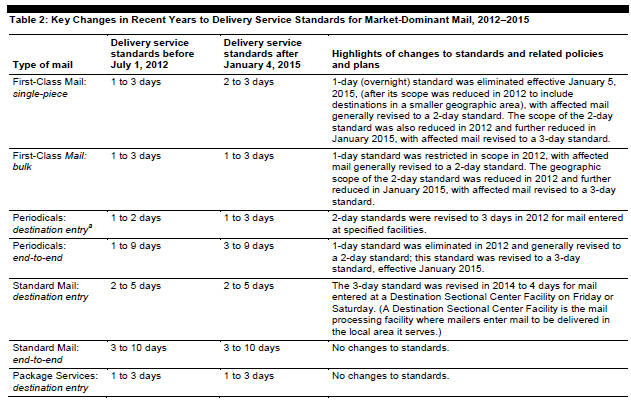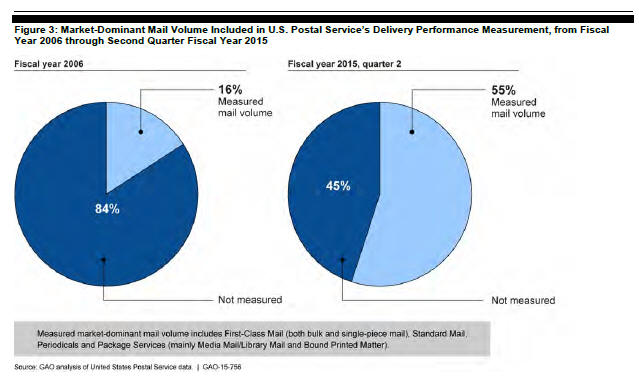PRC says USPS OIG is mandated under PAEA – – not the Commission to audit data collection systems
U.S. Postal Service (USPS) measurement of on-time delivery performance has expanded greatly over the past 9 years, but remains incomplete because only 55 percent of market-dominant mail (primarily First-Class Mail, Standard Mail, Periodicals, and Package Services) is included (see fig.). The remaining 45 percent is excluded due to various limitations, such as not having barcodes to enable tracking. Incomplete measurement poses the risk that measures of on-time performance are not representative, since performance may differ for mail included in the measurement, from mail that is not. Complete performance information enables effective management, oversight, and accountability.
In addition, the Postal Regulatory Commission (PRC) has not fully assessed why USPS data are not complete and representative. While PRC’s annual reports have provided data on the amount of mail included in measurement, they have not fully assessed why this measurement was incomplete or whether USPS actions will make it so. PRC may initiate a public inquiry docket (a type of proceeding) to improve data quality and completeness, but has not done so. Such a proceeding could facilitate evaluating data quality and identifying areas for improvement, as well as actions and time frames to complete improvements.
 USPS’s and PRC’s reports on delivery performance are not as useful as they could be for effective oversight because they do not include sufficient analysis to hold USPS accountable for meeting its statutory mission to provide service in all areas of the nation. USPS’s and PRC’s reports provide analysis, as legally required. However, this national-level analysis does not facilitate an understanding of results and trends below the national level, such as for USPS’s 67 districts, to identify variations and areas where improvements are needed. Further, delivery performance information is not sufficiently transparent or readily available. USPS posts only the most recent quarterly report on its website making it difficult for stakeholders to access trend data. Also, USPS and PRC are not required to provide—and do not report—performance information for rural areas. While several Members of Congress have recently requested studies on rural delivery performance, USPS has stated that such analysis would be costly, even though it could not provide specific cost estimates. Such cost information would be useful for Congress to assess whether developing this information would be appropriate.
USPS’s and PRC’s reports on delivery performance are not as useful as they could be for effective oversight because they do not include sufficient analysis to hold USPS accountable for meeting its statutory mission to provide service in all areas of the nation. USPS’s and PRC’s reports provide analysis, as legally required. However, this national-level analysis does not facilitate an understanding of results and trends below the national level, such as for USPS’s 67 districts, to identify variations and areas where improvements are needed. Further, delivery performance information is not sufficiently transparent or readily available. USPS posts only the most recent quarterly report on its website making it difficult for stakeholders to access trend data. Also, USPS and PRC are not required to provide—and do not report—performance information for rural areas. While several Members of Congress have recently requested studies on rural delivery performance, USPS has stated that such analysis would be costly, even though it could not provide specific cost estimates. Such cost information would be useful for Congress to assess whether developing this information would be appropriate.
Similar to USPS, PRC’s reporting of delivery performance information is not readily available to stakeholders. While PRC also posts delivery performance information provided by USPS on its public website, stakeholders would have to find numerous files in multiple locations on its website to compile data necessary for understanding performance trends, such as whether on-time delivery is improving or getting worse. In addition, PRC’s reports are not easily accessible. PRC has reported its annual assessment of USPS’s delivery performance in fiscal year 2014 in two reports that are filed on its website at different times and at different links, while USPS’s quarterly data are posted at another link on PRC’s website. The lack of easily accessible and readily available performance information on USPS’s and PRC’s part impedes the ability of Congress, mailers, and customers to review and hold USPS accountable for its performance and to use the information to develop realistic expectations for when their mail will be delivered.
USPS’s Office of Inspector General is also required to regularly audit the data collection systems and procedures used for collecting and reporting delivery performance information. 39 U.S.C § 3652(a)(2).
The PRC in its response to the GAO report stated :  Rural Delivery Performance Information Is Not Required to Be Reported
Rural Delivery Performance Information Is Not Required to Be Reported
USPS and PRC are not required to report—and do not report—delivery information for rural and non-rural areas, thus limiting effective oversight in these areas. USPS and PRC officials told us that they do not provide information or analysis to assess delivery performance specifically for rural areas because they are not legally required to do so. Without data on rural delivery performance, Congress cannot determine the extent delivery performance is timely in rural versus non-rural areas, and neither USPS nor PRC can prove or disprove any perceptions that rural areas may be affected differently than non-rural areas.
Quality delivery performance information is needed for USPS and postal stakeholders such as PRC, Congress, business mailers, and the general public to develop useful analysis that can help oversee or assess the balance between USPS’s cost-cutting to address its poor financial situation while maintaining affordable postal rates and providing timely universal delivery service. Thus, it is important for both USPS and PRC to report delivery performance information in a sufficiently complete, transparent, and useful manner
In addition, USPS’s reporting of delivery performance information is not sufficiently transparent. To be considered transparent, the criteria we identified suggest that delivery performance information is to be reported in a manner that is easily accessible and readily available. USPS, however, posts only its most recent quarterly report of area and district-level data on its public website. USPS, Service Performance Results, accessed on August 31, 2015, As a result, stakeholders would have to request numerous files from USPS to compile data necessary for understanding performance trends….
 To assist in determining whether to require USPS and PRC to report on delivery performance for rural and non-rural areas, Congress should direct USPS to provide cost estimates related to providing this information.
To assist in determining whether to require USPS and PRC to report on delivery performance for rural and non-rural areas, Congress should direct USPS to provide cost estimates related to providing this information.
List of Requesters
The Honorable Thomas R. Carper Ranking Member Committee on Homeland Security and Governmental Affairs United States Senate
The Honorable Heidi Heitkamp Ranking Member Subcommittee on Regulatory Affairs and Federal Management Committee on Homeland Security and Governmental Affairs United States Senate
The Honorable Claire McCaskill Ranking Member Permanent Subcommittee on Investigations Committee on Homeland Security and Governmental Affairs United States Senate
The Honorable Jon Tester United States Senate
Instead of having Postal management track the mail, they insist that the low life workers track every thing that comes to the Post office. Why not have the stupidvisors scan everything in sight and let the employees do their work? That would mean much less coffee and donuts would be needed! And the stupidvisors would be the ones disciplined over missed scans.
The continued rhetoric from the last two PMG’s,expressly favors parcel deliveries and 2 s limited extent some bulk-rate advertisements. All other USPS,deliveries r potrayed as in decline and/or yes2day postal-service. Does top USPS management really care at all,for instance,about door-to-door on-time delivery of 1st.class letters and flats? I doubt it.